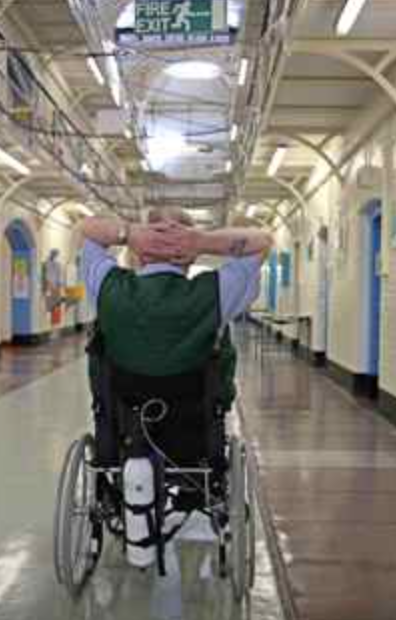“I have been waiting more than 11 years for a working wheelchair that I am not tying together with string and ripped T-shirts,” said plaintiff Harrell Bonner.
The nonprofit organizations Disability Rights Advocates (DRA) and Prisoners’ Legal Services of New York (PLS) filed a class action lawsuit against the New York State Department of Corrections and Community Supervision (DOCCS) on behalf of people with disabilities who are incarcerated at Five Points Correctional Facility and have been denied mobility-related accommodations they need to get around. Read the complaint here.
Specifically, the lawsuit alleges that DOCCS routinely confiscates people’s mobility aids, like wheelchairs and canes, on arrival, even if they were issued by DOCCS at other facilities; refuses to replace or provide mobility aids when needed; provides broken and unusable shared wheelchairs that are difficult to access and not individualized to the needs of the person with a disability; and denies people assistants to help with cell cleaning and other tasks.
Additionally, the plaintiffs assert that people who use wheelchairs and cannot push themselves have no reliable way to get around the facility because of DOCCS’ reliance on an ad-hoc process of calling other people who are incarcerated (known as “pushers”) to push them. The complaint charges that people who use wheelchairs are routinely left stranded while trying to get to and from facility services and programs like meals, medical visits, phone calls, recreation, and the law library. DOCCS’ administration of the pusher program is so inadequate, the lawsuit alleges, that people with disabilities who need pushers themselves are sometimes assigned to be pushers for others.
Plaintiffs Robert Cardew, Harrell Bonner, Philip Nelson, Melvin Johnson, and Khalik Jones have disabilities that require the use of wheelchairs and canes. Plaintiffs have experienced issues such as delays of a year or more to receive requested mobility aids, often only to receive items in disrepair and not individualized for their needs. The shared wheelchairs in Five Points are repeatedly vandalized, too big or too small, have loose wheels, ragged armrests, and missing foot rests. Mr. Bonner has used a ripped T-shirt to tie the arm of his chair to its seat. Mr. Cardew was repeatedly told that if he could not push himself to meals, he could simply not eat. Mr. Nelson frequently has no access to a wheelchair, and as a result falls five or six times a month and once broke his nose from a fall. Despite his requests for consistent access to a wheelchair and a pusher, Mr. Nelson was himself assigned to be a pusher. When called to push someone else, he would use the wheelchair’s handles as a walker to support himself. Because DOCCS does not find anyone to assist him, Mr. Johnson is regularly forced to push himself to and from places, even though it is dangerous and painful for him. Mr. Jones requires a cane, but has twice had his cane (provided by other DOCCS facilities) confiscated upon arriving at Five Points. As a result, he has fallen multiple times, including once down stairs.
Plaintiffs maintain that DOCCS’ significant failures to provide these necessary mobility aids and services amount to unlawful discrimination against not just Plaintiffs, but a class of people with mobility-related disabilities who have been unable to safely and meaningfully navigate the facility and the programs and services it offers, in violation of the Americans with Disabilities Act (ADA) and Section 504 of the Rehabilitation Act of 1973.
“It has been a constant struggle with DOCCS to get a wheelchair that isn’t falling apart and someone to push it,” said plaintiff Robert Cardew. “When I have to push myself, I can’t breathe and my chest hurts. I shouldn’t be hurting myself like this just to get to and from meals and programs, or spending hours a day waiting for someone to help me. Things need to change not just for me but for all of the other guys in here who can’t get around.”
“I have been waiting more than 11 years for a working wheelchair that I am not tying together with string and ripped T-shirts,” said plaintiff Harrell Bonner. “I can’t get to meals, to the yard, or even the bathroom because I can’t get a pusher. The situation is dehumanizing and stressful. Five Points needs to do right by all of us who use wheelchairs and canes.”

“DOCCS has failed to ensure that people with mobility disabilities have access to the accommodations they need and are entitled to under the law,” said Torie Atkinson, Staff Attorney at Disability Rights Advocates. “It is time for DOCCS to abolish this discriminatory patchwork system and provide people with disabilities working wheelchairs, canes, cell assistants, and a functional way to get around the facility.”
“The lack of appropriate accommodations for our clients with disabilities has left them vulnerable to abuse, unable to access essential services and, in some cases, with worsened medical conditions,” said Megan Welch, Staff Attorney at Prisoners’ Legal Services of New York.
“The road to protecting the rights of people with disabilities in prison has been a long one and PLS has played an integral role in that fight,” said Karen Murtagh, Executive Director of PLS. In 2002, PLS and other advocates filed a lawsuit on behalf of people with mental health disabilities in prison. That complaint, like the one filed today, alleged that New York State was in violation of the ADA and the Rehabilitation Act, by disciplining people rather than addressing their serious mental health needs. “In 2006, the State settled that case, agreeing, among other things, not to place people with ‘serious mental illness’ in solitary confinement. Today, PLS is once again championing the rights of people with disabilities in prison, and I have no doubt we will, once again, prevail,” said Murtagh.
The plaintiffs and class members seek a declaration that these practices are illegal and an injunction to require DOCCS to change its policies and practices so that people with mobility disabilities at Five Points have the accommodations they need to get around the facility and access all of the programs, services, and activities that non-disabled people there can access. The plaintiffs also seek compensatory damages for the pain and suffering they have experienced as a result of this treatment.
About Disability Rights Advocates
Founded in 1993, Disability Rights Advocates (DRA) is the leading national nonprofit disability rights legal center. Its mission is to advance equal rights and opportunity for people with all types of disabilities nationwide. DRA represents people with the full spectrum of disabilities in complex, system-change, class action cases. DRA is proud to have upheld the promise of the ADA since our inception. Thanks to DRA’s precedent-setting work, people with disabilities across the country have dramatically improved access to health care, employment, transportation, education, disaster preparedness planning, voting and housing. For more information, visit www.dralegal.org.
About Prisoners’ Legal Services of New York
Prisoners’ Legal Services of New York (PLS) is a non-profit legal services organization founded in 1976 to provide indigent incarcerated New Yorkers access to the courts. There are over 32,000 individuals incarcerated in 51 prisons across New York State, and PLS responds to more than 10,000 requests for assistance annually. Our mission is to provide high quality, effective legal representation and assistance to indigent prisoners, to help them to secure their civil and human rights, and to advocate for humane prisons and for a more humane criminal justice system. For more information, visit www.plsny.org.


Join the conversation!